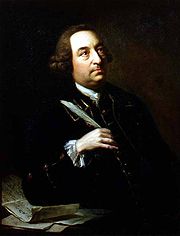
John Christopher Smith
Encyclopedia

Ansbach
Ansbach, originally Onolzbach, is a town in Bavaria, Germany. It is the capital of the administrative region of Middle Franconia. Ansbach is situated southwest of Nuremberg and north of Munich, on the Fränkische Rezat, a tributary of the Main river. As of 2004, its population was 40,723.Ansbach...
1712 - d Bath 1795) was an English composer who, following in his father's footsteps, became George Frederic Handel's secretary and amanuensis.
Life
John Christopher Smith was the son of Johann Christoph Schmidt (John Christopher Smith Sr.) (d 1763), Georg Frideric Handel's first copyist in LondonLondon
London is the capital city of :England and the :United Kingdom, the largest metropolitan area in the United Kingdom, and the largest urban zone in the European Union by most measures. Located on the River Thames, London has been a major settlement for two millennia, its history going back to its...
. His father, known to Handel from Halle
Halle, Saxony-Anhalt
Halle is the largest city in the German state of Saxony-Anhalt. It is also called Halle an der Saale in order to distinguish it from the town of Halle in North Rhine-Westphalia...
, was summoned from Germany in 1716. He brought his family to London around 1720. John Christopher Smith, junior, later became Handel's secretary, musical assistant and amanuensis
Amanuensis
Amanuensis is a Latin word adopted in various languages, including English, for certain persons performing a function by hand, either writing down the words of another or performing manual labour...
, when blindness prevented Handel from writing or conducting in his later years. From 1753 to 1759, he conducted to Handel's oratorios that were to be performed in those years. The last year where Handel conducted to the performances of his oratorios was 1752. Handel bequeathed to the Smith family his collection of keyboard instruments in his house at 25 Brook Street
Handel House Museum
The Handel House Museum is a museum in Mayfair, London dedicated to the life and works of the German born baroque composer George Frideric Handel, who made his home in London in 1712 and eventually became a British citizen in 1727. Handel was the first occupant of 25 Brook Street, which he rented...
. Smith had a few lessons from Handel and Johann Christoph Pepusch
Johann Christoph Pepusch
Johann Christoph Pepusch , also known as John Christopher Pepusch and Dr Pepusch, was a German-born composer who spent most of his working life in England....
but studied mostly with Thomas Roseingrave
Thomas Roseingrave
Thomas Roseingrave was an Irish musician and organist.-Early years:He was born at Winchester but spent his early years in Dublin, studying music with his father, Daniel Roseingrave. In 1707 he entered Trinity College but failed to complete his degree...
. He retired to Bath in the 1770s.
Works
Smith's first opera was the Italian-style Ulysses (1733); later ones included two written for David GarrickDavid Garrick
David Garrick was an English actor, playwright, theatre manager and producer who influenced nearly all aspects of theatrical practice throughout the 18th century and was a pupil and friend of Dr Samuel Johnson...
and based on Shakespeare - The Fairies (1755), after A Midsummer Night's Dream
A Midsummer Night's Dream
A Midsummer Night's Dream is a play that was written by William Shakespeare. It is believed to have been written between 1590 and 1596. It portrays the events surrounding the marriage of the Duke of Athens, Theseus, and the Queen of the Amazons, Hippolyta...
, and The Tempest
The Tempest (Smith)
The Tempest or The Enchanted Isle is an opera in three acts by composer John Christopher Smith. The work's English language libretto by David Garrick is based on the 1611 play of the same name by William Shakespeare. The opera premiered on 11 February 1756 in London at the Theatre Royal, Drury...
(1756) - and a successful afterpiece, The Enchanter (1760). Several others remained unperformed. In 1759-68 he directed the annual performances of Messiah at the Foundling Hospital
Foundling Hospital
The Foundling Hospital in London, England was founded in 1741 by the philanthropic sea captain Thomas Coram. It was a children's home established for the "education and maintenance of exposed and deserted young children." The word "hospital" was used in a more general sense than it is today, simply...
, where he was organist. Of his own oratorios, mostly written in the 1760s, Paradise Lost
Paradise Lost
Paradise Lost is an epic poem in blank verse by the 17th-century English poet John Milton. It was originally published in 1667 in ten books, with a total of over ten thousand individual lines of verse...
(1760) was the greatest success (with words by Benjamin Stillingfleet
Benjamin Stillingfleet
Benjamin Stillingfleet was a botanist, translator and author. He is said to be the first Blue Stocking, a phrase from which is derived the term bluestocking now used to describe a learned woman.-Life:...
); three later ones (Nabal, Rebecca and Gideon) were largely reworkings of Handel's music. Among his other works are five volumes of harpsichord music (1732–63) and a funeral service (1772) for the dowager Princess of Wales, who was his harpsichord pupil.

